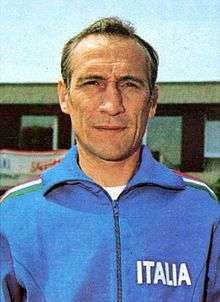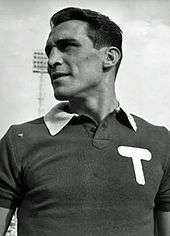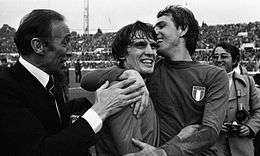Enzo Bearzot
 Bearzot c. 1975 | |||||||||
| Personal information | |||||||||
|---|---|---|---|---|---|---|---|---|---|
| Full name | Enzo Bearzot | ||||||||
| Date of birth | 26 September 1927 | ||||||||
| Place of birth | Aiello del Friuli, Italy | ||||||||
| Date of death | 21 December 2010 (aged 83) | ||||||||
| Place of death | Milan, Italy | ||||||||
| Playing position | Defender | ||||||||
| Senior career* | |||||||||
| Years | Team | Apps | (Gls) | ||||||
| 1946–1948 | Pro Gorizia | 39 | (2) | ||||||
| 1948–1951 | Internazionale | 19 | (0) | ||||||
| 1951–1954 | Catania | 95 | (5) | ||||||
| 1954–1956 | Torino | 65 | (1) | ||||||
| 1956–1957 | Internazionale | 27 | (0) | ||||||
| 1957–1964 | Torino | 164 | (7) | ||||||
| Total | 409 | (15) | |||||||
| National team | |||||||||
| 1955 | Italy | 1 | (0) | ||||||
| Teams managed | |||||||||
| 1964–1967 | Torino (youth) | ||||||||
| 1968–1969 | Prato | ||||||||
| 1969–1975 | Italy U23 | ||||||||
| 1975–1986 | Italy | ||||||||
Honours
| |||||||||
|
* Senior club appearances and goals counted for the domestic league only. | |||||||||
Vincenzo "Enzo" Bearzot (Italian pronunciation: [ˈɛntso bearˈtsɔt];[1] 26 September 1927 – 21 December 2010) was an Italian professional football manager and former footballer, who played as a defender or midfielder. He led the Italian national team to a triumph in the 1982 FIFA World Cup.
Nicknamed Vecio (vecchio, 'old man'),[2] he holds the record for most appearances on the bench of the Italian national team at 104 times from 27 September 1975 to 18 June 1986.[3]
A year after his death, an award was named in honour of the 1982 World Cup winning coach, the "Enzo Bearzot Award", for the best Italian coach of the year.[4]
Club career

Born in Aiello del Friuli, in the friulian Province of Udine in Friuli-Venezia Giulia, Bearzot was son of a bank teller and attended high school at Udine.[5] He had a moderately successful playing career as a centre back. Enzo Bearzot made his debut in professional football with Pro Gorizia in 1946, a team he left in 1948 to join Internazionale. After three seasons with the Nerazzurri, Bearzot moved to Sicily and joined Catania for three more seasons.
In 1954 he moved to Torino, which was rebuilding after the tragedy of Superga in 1949. In two seasons as a starter he played 65 matches, scoring one goal. In 1956 he returned to Internazionale where he appeared 27 times, the last of which was a 3–2 defeat at Bologna on 9 June 1957. The following year he returned to Torino. Here, he made 164 appearances and scored 7 goals for the Granata before retiring in 1964, aged 37, to take up coaching.
In his playing career, Bearzot totalled 251 appearances in Italy's Serie A, being called up once to play for Italy, making his debut on 27 November 1955 in a 0–2 1955–56 Central European International Cup match defeat to Hungary.[6]
Managerial career

After having ended his playing career, Bearzot became assistant coach of Torino, working alongside Italian managers Nereo Rocco and Giovan Battista Fabbri. He successively moved in Tuscany to take his first head coaching job in Tuscany at the helm of Serie C side Prato.
However, Bearzot did not go on a club career, and chose instead to start working for the Italian Football Federation: first as under-23 head coach, then as assistant coach of Ferruccio Valcareggi in the 1974 FIFA World Cup. After the German World Cup, Bearzot was appointed as assistant coach of Fulvio Bernardini, and was then promoted head coach of Italy in 1975. It was Bearzot who drove the national team to fourth place in the 1978 FIFA World Cup,[7] obtained thanks to one of the most exciting playing styles in the competition. This performance was repeated in the 1980 European Championship, hosted by Italy.[7]

In the 1982 FIFA World Cup, after poor performances in the three first matches, Bearzot announced the so-called silenzio stampa (press silence) in order to avoid rising criticism from the Italian press. Following that, the Italian team finally started to play its best football, defeating Argentina and Brazil in the second round, Poland in the semi-final and Germany in the Final, and winning the World Cup for the first time since 1938.[7]
Italy did not qualify for the Euro 1984.[7] Bearzot resigned after the 1986 FIFA World Cup, which saw Italy being defeated in the round of 16 by France.[7] Bearzot was criticised during the latter tournament for relying too heavily on players from the 1982 team, as some of them were past their best form by 1986.[7]
He holds the record for the most amount of times on the bench as manager of Italy at 104 times.[8]
After a long period of inactivity, Bearzot was appointed President of the FIGC Technical Sector (Settore Tecnico, the main football coaching organization of Italy) in 2002. He left this office in 2005.
Death
He died on 21 December 2010 in Milan at the age of 83, exactly 42 years after Vittorio Pozzo; he was buried in the family tomb in the cemetery of Paderno d'Adda.[9][10][11][12]
Honours
Club
International
- FIFA World Cup (1): 1982
Individual
- Seminatore d'oro: 1982
- World Soccer Magazine World Manager of the Year: 2006[13]
- Panchina d'Oro alla carriera: 1992[14]
- Inducted into the Italian Football Hall of Fame (posthumous honour, 2011)[15]
Orders
- 2nd Class / Grand Officer: Grande Ufficiale Ordine al Merito della Repubblica Italiana: 1982[16]

References
- ↑ "Dizionario d'ortografia e di pronunzia". dizionario.rai.it (in Italian). RAI. Retrieved 17 May 2014.
- ↑ L'Italia piange Enzo Bearzot – Calcio – Sportmediaset. Sportmediaset.mediaset.it (21 December 2010). Retrieved on 2016-07-23.
- ↑ Italian National Team Coaches. Rsssf.com (14 July 2016). Retrieved on 2016-07-23.
- ↑ "Leicester's Claudio Ranieri wins Enzo Bearzot award for best Italian coach". ESPNFC. 6 April 2016. Retrieved 7 April 2016.
- ↑ Dell'Arti, Giorgio (14 August 2014). "Enzo Bearzot". cinquantamila.it (in Italian). Milan: Corriere della Sera.
- ↑ "UNGHERIA – ITALIA". Italian Football Federation. Retrieved 29 December 2010.
- 1 2 3 4 5 6 Marzocchi, Massimo (22 December 2010). "Italians bid farewell to 1982 hero Enzo Bearzot". The Scotsman. Retrieved 22 December 2010.
- ↑ Rec.Sport.Soccer Statistics Foundation (ed.). "Italian national team coaches". rsssf.com. Retrieved 25 April 2016.
- ↑ "1982 World Cup winning coach Enzo Bearzot dies". Malta Today. Retrieved 21 December 2010.
- ↑ "È morto Enzo Bearzot. Addio al C.T. di Spagna '82" [Enzo Bearzot has died. Farewell to the coach of España 1982] (in Italian). La Gazzetta dello Sport. 21 December 2010. Retrieved 21 December 2010.
- ↑ "Addio a Enzo Bearzot, Italy's 1982 World Cup-winning coach" [Farewell to Enzo Bearzot, coach of the World-champion Italy] (in Italian). la Repubblica. 21 December 2010. Retrieved 21 December 2010.
- ↑ "Italian coaching legend Enzo Bearzot dies at 83". BBC Sport. 21 December 2010. Retrieved 21 December 2010.
- ↑ Jamie Rainbow (14 December 2012). "World Soccer Awards – previous winners". World Soccer.com. Retrieved 21 December 2015.
- ↑ "Albo "Panchina d'Oro"" (in Italian). 1 February 2010. Archived from the original on 7 July 2011. Retrieved 21 December 2015.
- ↑ "Hall of fame, 10 new entry: con Vialli e Mancini anche Facchetti e Ronaldo" [Hall of fame, 10 new entries: with Vialli and Mancini also Facchetti and Ronaldo] (in Italian). La Gazzetta dello Sport. 27 October 2015. Retrieved 27 October 2015.
- ↑ "Grande Ufficiale Ordine al Merito della Repubblica Italiana Bearzot Sig. Enzo". quirinale.it (in Italian). Il Quirinale. 25 October 1982. Retrieved 22 December 2015.
External links
| Wikimedia Commons has media related to Enzo Bearzot. |
| Awards and achievements | ||
|---|---|---|
| Preceded by |
UEFA Euro host country managers 1980 |
Succeeded by |
| Preceded by |
FIFA World Cup Winning Manager 1982 |
Succeeded by |